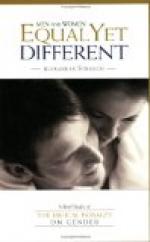If women had a right to vote, say some, it would occasion family contention. Why should it? If a woman thinks as her husband, she will vote as he does; if not, none but an unreasonable and overbearing man would insist that his wife must think as he does, and vote in accordance with his views, whether they agree with her own or not. It would be quite as just and as reasonable to urge that, because the peace of families is sometimes disturbed by fathers and sons voting for opposite parties, therefore, the sons should not be allowed to exercise the franchise during the life-time of their fathers. There are differences of opinion concerning politics in families now; there always have been, and always will be, unless some process can be devised whereby women will be deprived of the power of thought. Are these existing differences less to be deprecated than those likely to result from extending the franchise to women? How can it be supposed that the peace of families is secured by men only having the liberty to give practical expression to their views, by recording votes which may tell for the good or ill of the country, while women have not? though very frequently a woman has the outrage put upon her of knowing that her husband is recording a vote upon her property, not his, for a party to which she is conscientiously opposed. And this in a civilized, not a barbarous, land! Where is either the justice or the moral honesty of such a course of procedure? Surely, if a woman did vote for a candidate or for a measure to which her husband is opposed, it is no worse, and ought to produce no more disturbance in the family, than for him to vote for a candidate or measure to which she is opposed, especially where the property qualification is in her own right, or where—as is very frequently the case—she has worked equally hard in earning it; nor would disturbance be produced by it at any time, were men as much disposed to be just as women are to forgive injury.
Then, there are many intelligent, industrious, and enterprising women who never marry; and many more who do, are left widows early in life, and remain so to its end. These women contribute quite as much to the public good as do unmarried men in similar circumstances. Why, then, should the one enjoy the privilege of the ballot-box or the polls, and it be denied to the other? There is no just reason whatever. Nothing but usage makes such an injustice tolerated; nothing but the love of arbitrary power causes it to be advocated.
The assertion that the majority of women care nothing about politics or the exercise of any right not now enjoyed by them, is about as true as the asseverations of those who opposed the passage of the late “Reform Bill” in England, that the majority of the middle and poorer classes were satisfied with the privileges enjoyed, and would scarcely—the poorer classes especially—be able to vote intelligently if the privilege were allowed. It was roundly




